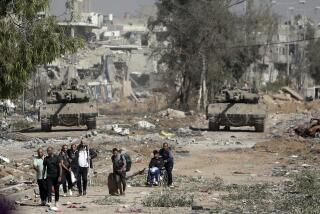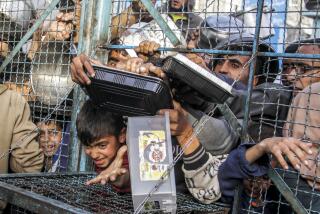Amid Egypt’s border easing, Gazans feel rare hope
Egypt eased border restrictions for residents of the Gaza Strip long bottled up by an Israeli-led blockade of the seaside enclave in another potent sign of the changes shaking the status quo across the Middle East — and pressing Gaza’s ruling militant group, Hamas, toward moderation.
A rare mood of optimism reigned Saturday at the Rafah border crossing into Egypt, where hundreds took advantage of new, relaxed rules they hope will mark the end of the blockade imposed after Hamas seized control of Gaza in 2007.
With almost an equal number of journalists on hand, anxious Gazans, many with suitcases and children in tow, made the journey in a convoy of buses.
“It seems things are finally changing for the better,” said Zahara Abu Naji, at age 56 preparing to leave Gaza for the first time in her life. She was on her way to visit her husband in Algeria, whom she hasn’t seen in a year.
Among the others leaving Saturday were businessmen, a Palestinian American who said he’d been unable to get permission to leave since Christmas, and several medical patients, including an infant requiring emergency surgery.
After four years of rising poverty, international sanctions and conflict, including an Israeli incursion in late 2008 and early 2009, Gazans’ spirits have been bolstered by some good news: a pending reconciliation between Hamas and its rival, the West Bank-based Fatah; promises of investment to rebuild Gaza’s infrastructure; and signs of economic growth fueled by Israel’s move last year to loosen import restrictions on household goods.
But in a place where half the people are still unemployed and 70% need international aid to survive, residents worry that progress could prove to be fleeting. They say their futures depend on a power struggle brewing inside Hamas.
Longtime Egyptian President Hosni Mubarak, forced from office in February by street protests, had kept the Rafah crossing completely closed, or tightly regulated, since 2007. Israel, which has long accused Hamas of smuggling weapons through the border crossing, urged the military government that replaced Mubarak to keep it tightly controlled.
Israeli Vice Prime Minister Silvan Shalom last week called Egypt’s move to open it a “grave problem.” Egyptian officials have also started reaching out to Israel’s archenemy, Iran.
Beginning Saturday, Egyptian officials allowed women, children and men over 40 to enter from Gaza without a visa. No goods are being allowed to pass through the Rafah crossing at this time.
The move was a reward to Hamas for agreeing in Egyptian-brokered talks to form a united Palestinian government, a surprise move by the militant group that reflected the battle in its ranks between ideology and pragmatism.
“We are at a crossroads,” said Yahiya Moussa, a high-ranking Hamas lawmaker. “The world is changing and Hamas is changing too.”
Now a group that last month fired a rocket that killed an Israeli teenager on a school bus and whose prime minister lamented the killing of Osama bin Laden is debating whether to restrain its behavior and rhetoric in an attempt to reconcile with the more moderate Fatah and get punishing financial sanctions lifted.
Last week, President Obama called upon Hamas, which the United States and Israel label as a terrorist group, to go even further by recognizing Israel, renouncing violence and honoring past peace deals.
Hamas leaders say the group is unlikely to go that far. But Moussa said it may agree to allow the unity government, which is expected to be unveiled in the next month, to formally endorse such terms.
“Why not?” Moussa said, noting that the proposed government would be made up of technocrats with limited authority and a one-year term.
Not everyone in Hamas agrees. In a recent newspaper interview, Mahmoud Zahar, a senior Hamas hard-liner in Gaza, criticized Hamas leader Khalid Meshaal for suggesting that the group would soften its opposition to peace talks and give Palestinian Authority President Mahmoud Abbas another year to reach a deal with Israel. Such internal disputes almost never find their way into the press.
It’s a sign of the mounting pressure on Hamas, particularly after the uprisings elsewhere in the Arab world. In Syria, where Hamas leaders have been based for years, the Assad regime is looking increasingly unstable, which many say might have pushed Hamas to seek the reconciliation deal.
In Gaza, support for Hamas is plummeting, recent polls show — notably among young people, who have been in the forefront of recent democracy movements around the region.
Three-fourths of Gaza youths ages 18 through 29 support “regime change,” according to Palestinian pollster Khalid Shikaki. “Hamas has lost the youth who put them in power,” he said. In March, several thousand youths protested in support of reconciliation, briefly clashing with security forces.
Privately, one Hamas official acknowledged that Gaza residents blame the group for worsening poverty and international isolation. He said Hamas would garner less than one-third of the vote if elections were held today.
Gaza resident Wesam Saleh, 33, was such a staunch supporter four years ago that he got into an altercation with a co-worker who criticized Hamas. But now he’s deserted it.
“They need to change their policies in order to build bridges and relationships between Palestinians and the West,” Saleh said. “We feel like we live in a prison. They should just accept the international conditions and recognize Israel so we can improve the situation here.”
Such a shift would probably be seen by some as a sign of weakness and hypocrisy.
One Hamas security officer, who only wanted to be identified as Abu Hamza, said he doesn’t care so much about Hamas’ Islamist beliefs or political ideals. But he said he draws the line at making concessions toward Israel.
“I want Hamas to stick with the resistance,” said the 26-year-old fighter. “It’s the duty of every Muslim. If they accept the [international] conditions, I wouldn’t support them anymore. Then they’d be just like Fatah.”
Still, the modest improvements seen in Gaza in recent month are increasing the public pressure on Hamas to be flexible.
A year ago, common items such as coriander and canned fruit were virtually banned by Israel. Medical patients needing outside treatment sometimes died waiting for approval to cross into Israel or Egypt. Fatah supporters here were subjected to arrest or harassment.
Under international pressure, Israel relaxed restrictions on many goods passing across its border last summer, ending shortages and lowering prices.
New imported cars are a common sight on Gaza City’s streets, and the first mega-grocery store is set to open soon. Construction materials are still tightly restricted and hundreds of homes have yet to be reconstructed, but work is underway on two new schools. A key highway was recently repaved.
In a sign of growing political tolerance, yellow Fatah flags, which had been banned, now fly above many Gaza homes.
Nafez Nayef, 42, a Fatah supporter living in Gaza, said he’s more optimistic than he’s been in years. He hopes he can soon return to his government job, which was suspended after the split with Hamas.
After tasting a bit of freedom and progress, he said, Gazans will have a hard time turning back.
“We’ve suffered enough,” Nayef said. “If the reconciliation were to fall through now, people would take to the streets. I would take to the streets too. There’s no way I’m going to live through another four years of oppression and poverty.”
Special correspondent Ahmed Aldabba contributed to this report.
More to Read
Start your day right
Sign up for Essential California for news, features and recommendations from the L.A. Times and beyond in your inbox six days a week.
You may occasionally receive promotional content from the Los Angeles Times.






